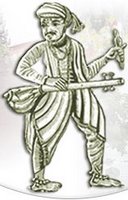:::::::::::::::::::::::::::::::::::::::::::::::::::::::::::::::::::::::::::::::::::::::::::::::::::::
Sant Tukaram Celebrations
***** Location: Pune, India
***** Season: Summer (June/July)
***** Category: Observance
*****************************
Explanation
Singing Bhajans of Sant Tukaram, Warkaris walk through Pune - literally!- for the main roads are blocked for traffic one day that these devotees stay in Pune, on their way to Pandharpur. Main road junctions have arrangements for refreshments and tea and food stalls are set up by the Government as well as individual groups. Bhajans of well known musicians blare from loud speakers – the whole mood is festive.
Sometimes when the Warkaris [ thousands of them] pass Pune – it would be scorching heat and other times, it would be raining heavily, depending on when the monsoon sets in that year. We always wonder how these devotees wade through such tough weather conditions. Villagers of all ages- we see old people as well as young mothers carrying their children! Some with foot wear – some walk bare. But one thing common is LOVE and religious fervor- clearly written on their faces.
Kala Ramesh
Saint Tukaram
xxxxxxxxxxxxxxxxxxxxxxxxxxxxx

Words are the only Jewels I possess
Words are the only Clothes that I wear
Words are the only food That sustains my life
Words are the only wealth I distribute among people
Says Tuka Witness the Word He is God
I worship Him With my words
Translation by Dilip Chitre (Says Tuka)
http://www.tukaram.com/
xxxxxxxxxxxxxxxxxxxxxxxxxxxxx
Tukaram (1608-1650)
is a poet of Marathi language spoken in Maharashtra, India.
Tukaram's towering stature as a poet has pervasive influence on Marathi language and literature. He represents the vital link in the mutation of a medieval Marathi literary tradition into modern Marathi literature. His poems (nearly 4500) encompass, the entire gamut of Marathi culture. The dimensions of his work are so monumental that they will keep many future generations of translators creatively occupied. In a sense,therefore, Tukaram is a poet who belongs more to the future than to a historically bound specific past.
www.tukaram.com
is a website on 17th century poet Tukaram.
The person behind this site is Mr. Dilip Dhonde, who nourishes dreams of popularising Sant Tukaram’s poems.

Illustration shown with permission from Mr. Dilip Dhonde, April 2006
The site is in Marathi, Hindi and English with translations of Tukaram in
Bangla(Rabindranath Tagore),
Hindi (Dr.Anandprakash Dixit and Shriram Shikarkhane),
French (Guy Poitevin),
German (Dilip Chitre and Lothar Lutze),
Russian (Irina Glushkova,Anagha Bhat and Sergei Serebriany),
Spanish (Elsa Cross)
and Esperanto (Annirudha Banhatti).
xxxxxxxxxxxxxxxxxxxxxxxxxxxxx
Palkhi
1000-year-old tradition followed by the Warkaris (people who follow the wari, a fundamental ritual). Palkhi is generally in the months of June-July or Ashad (according to the Hindu Calender). The Wakaris collectively go in Dindis singing and dancing, chanting Dnyanba-Tukaram.
The Palkhi as a whole starts in the month of Jyeshth (June) and the whole process lasts a total of 22 days. But it reaches Pune in the months of June or Mid July. It has a stay in Pune and then it goes ahead on its way. It reaches Pandharpur on the eleventh day of the first half of the month of Ashadh.
The youngest son of Tukaram, Narayan baba in 1685, brought about a change in the Dindi-Wari tradition by introducing the Palkhi, a sign of social respect.
The Silver Padukas (footsteps) of Tukaram were put in the Palkhi and Narayan baba proceeded with his dindi to Alandi where he put the padukas of Dnyaneshwar in the same Palkhi. In 1830 there was some dispute concerned with rights and privileges in the family of Tukaram. Following this, it was decided by some thoughtful persons to break-up the tradition of twin Palkhis and organise here after, two separate Palkhis - Tukaram Palkhi from Dehu and the Dnyaneshwar Palkhi from Alandi.
Since then till date, the Tukaram Palkhi and the Dnyaneshwar Palkhi meet in Pune for a days halt and then diverge at Hadapsar to meet again at Wakhri, a village nearby to Pandharpur. About 2 lakh devotees proceed along with the Sant Tukaram Palkhi from Dehu village, while a total of 2.5 lakh devotees join the Sant Dnyaneshwar Palkhi.
http://www.punediary.com/html/pola.html
*****************************
Worldwide use
*****************************
Things found on the way
*****************************
HAIKU
walking miles
through rain and sun
warkaris rejoice
Kala Ramesh
xxxxxxxxxxxxxxxxxxxxxxxxxxxxx
*****************************
Related words
*****
[ . BACK to WORLDKIGO . TOP . ]
:::::::::::::::::::::::::::::::::::::::::::::::::::::::::::::::::::::::::::::::::::::::::::::::::::::






No comments:
Post a Comment